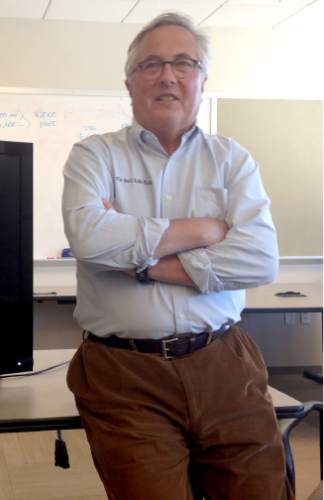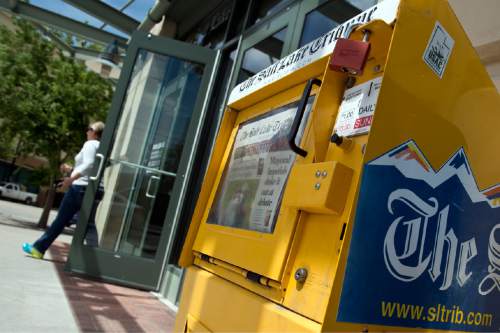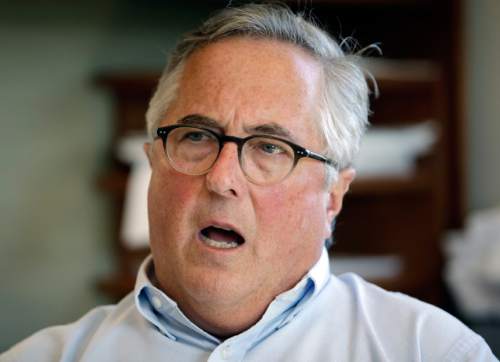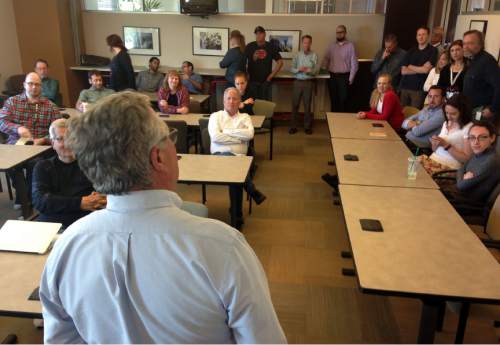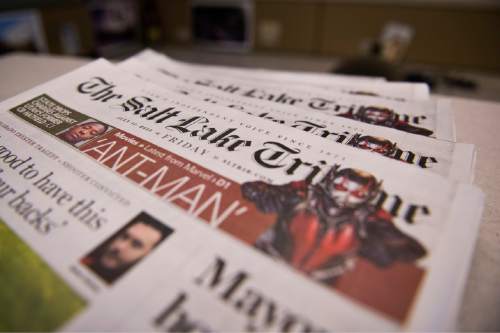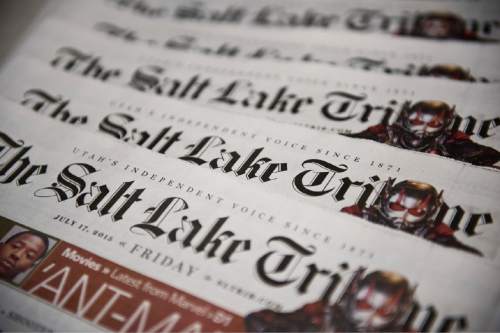This is an archived article that was published on sltrib.com in 2016, and information in the article may be outdated. It is provided only for personal research purposes and may not be reprinted.
After almost three years of uncertainty about The Salt Lake Tribune's ownership and financial status, officials announced Wednesday that the Huntsman family is buying Utah's largest daily newspaper.
Digital First Media, which owns The Tribune, confirmed it has entered into a purchase agreement with Paul Huntsman, son of Utah industrialist-philanthropist Jon Huntsman Sr.
The sale price and other terms have not been disclosed, although a source said the transaction was contingent on the end of a federal lawsuit and an antitrust probe targeting The Tribune's partnership with the Deseret News.
Nor was the direction of future management of the paper entirely clear. The players involved issued only a short news release announcing the deal and offered few added details.
Paul Huntsman, who heads a private-equity fund billed as the family's investment platform, said the Huntsmans were "honored to be stewards" of the 146-year-old newspaper.
"It is important that The Salt Lake Tribune continues in its indispensable role for our community and to be locally owned," Huntsman said. "We hope to ensure The Tribune's independent voice for future generations and are thrilled to own a business of this quality and stature."
Reached by The Tribune, Huntsman said that even though "many unanswered questions" remained, he declined to comment until the transaction was complete.
In the same news release, Steve Rossi, CEO of Digital First Media (whose chief shareholder is New York hedge fund Alden Global Capital), offered "great respect for Paul Huntsman and the Huntsman family."
"The Salt Lake Tribune will be in the hands of strong local management," Rossi said. "We wish Paul Huntsman, the Huntsman family and our partners at the Deseret News the best."
The LDS Church-owned Deseret News maintains a long-term business partnership with The Tribune, giving it a say in Tribune ownership. That church veto power had reportedly stalled prior Tribune sales talks involving the Huntsmans.
In a brief statement, the Utah-based faith said that "while The Church of Jesus Christ of Latter-day Saints has not participated in negotiations relating to a sale of The Salt Lake Tribune by Digital First Media, we wish both the Deseret News and The Tribune the best as they move forward."
An assistant to Paul Edwards, the News' top editor, said Wednesday he was the lone executive at the paper authorized to comment on the sale, but was out of the office and unavailable.
In a hastily convened newsroom meeting Wednesday morning, Tribune Editor and Publisher Terry Orme told staffers of the sale — which would include the print version, its online sltrib.com edition and its Web advertising arm, Utah Digital Services.
"This isn't a done deal," Orme told employees. "It will take a while to close."
Reaction among Tribune reporters, photographers and editors was upbeat. Orme said he welcomed the prospect of returning the paper to Utah owners.
"The Huntsman family is familiar with the role The Salt Lake Tribune plays in the community as a crucial watchdog involved in explanatory journalism," he said, "and they see the value of that."
It was not immediately known if the deal involved rewriting of The Tribune's joint-operating agreement (JOA) with the News. That decades-old accord was revised in fall 2013 to cut in half The Tribune's profits from the two dailies' shared operations, raising concerns about its long-term viability.
The JOA changes— negotiated without the knowledge of local Tribune managers — also sold the paper's share in West Valley City printing facilities and shifted control of the newspapers' joint operations to the News.
The new pact is the subject of an investigation by antitrust lawyers with the Department of Justice, as well as a federal lawsuit brought by a group called Citizens for Two Voices, made up of former Tribune employees and community members.
The grass-roots group is seeking to undo the JOA changes, saying they undermined The Tribune's independence and threaten its financial survival.
"Our goal has always been to see The Tribune back in Utah hands," said the group's leader Joan O'Brien. "This community requires and deserves the independent voice of The Tribune, and sale of the paper to a benevolent local owner will help ensure that voice remains strong."
O'Brien said the group's attorney, Karra Porter, had been informed that the deal hinged, in part, on Citizens for Two Voices withdrawing its lawsuit as well as an end of the Justice Department investigation.
Porter planned to meet Monday with Digital First attorneys to discuss the sale and a possible resolution of the legal challenge.
Said O'Brien: "I'd love to see our lawsuit mooted by a return to local ownership."
In his statement, Paul Huntsman referred to 18 months of negotiations with Digital First "to construct a transaction that would secure the long-term viability" of the newspaper.
He praised "the invaluable assistance" of Dean Singleton, a former Tribune publisher, and Jay Shelledy, a former Tribune editor, and thanked them for "their continuing counsel and support in this transaction."
Singleton, whose newspaper chain MediaNews Group owned The Tribune from 2000 to 2010, acknowledged helping to clinch the deal, but said he did not plan to be involved in Tribune management going forward.
"Getting The Tribune in solid local hands with a financial model that will sustain it for the long term was one of the most important items still left on my professional bucket list," Singleton said. "It ended up the way it needed to end up."
A media industry analyst noted that the Huntsman purchase fits an emerging ownership trend of wealthy business figures buying publications in their communities. Ken Doctor called Huntsman's entry "a best-case scenario for The Tribune."
"You have a local owner with deep pockets and a civic commitment who wants to see a long-term survival of a strong newspaper," Doctor told The Associated Press. "That stands in distinction to many of the shorter-term players, like Digital First Media."
Twitter: @TonySemerad


